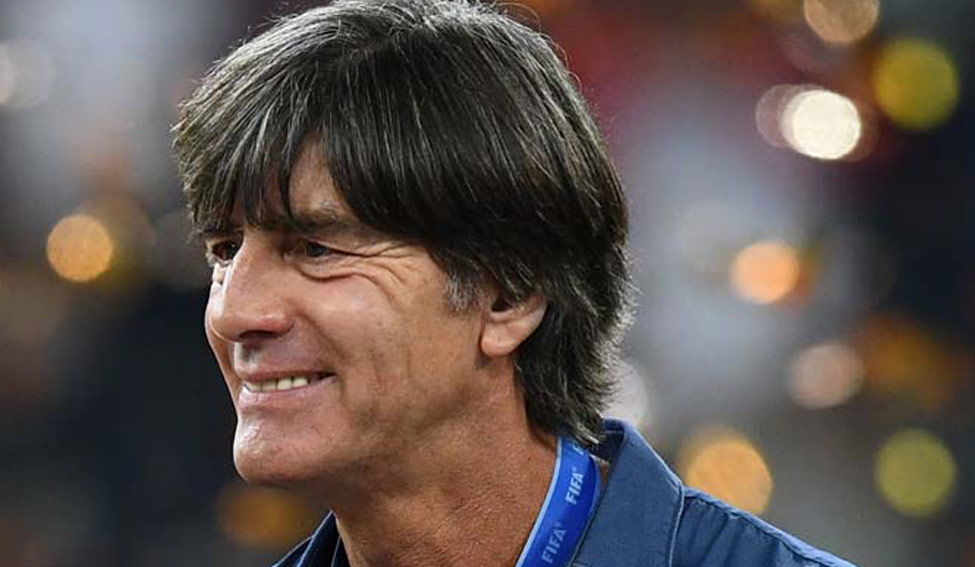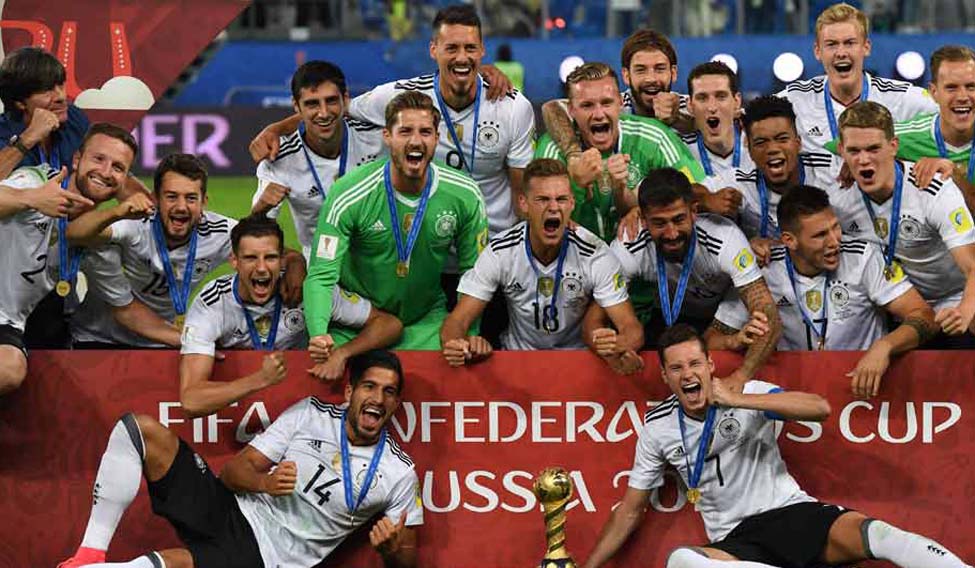On the eve of the much-publicised G20 summit in Hamburg, Chinese President Xi Jinping and German Chancellor Angela Merkel attended a football game between school teams from their countries. Jinping's love for the sport is well known, but his attendance at the game had deeper implications.
The Chinese Super League, which had received brickbats for its immoral spending on importing players, had issued a recent clampdown on foreign imports, with an intent to nurture homegrown talent. But they needed help, because China was never a traditionally football-loving country. So Jinping and his country's football federation forged a partnership with the one country that is being increasingly recognised as a shining model in the field of developmental football: Germany.
The reigning world champions have shown the world that they have slowly been building a dynasty, behind the curtains, with one side winning the Confederations Cup and another the under-21 Euros in the space of 48 hours, two weeks ago. The Confed Cup team did not contain even one member of 2014's World Cup winning squad, most of whom comprise of the actual first-team. From world domination in the 1970s to a disastrous start to the millenium to this jaw-dropping revival, Die Mannschaft, as the team is called, has come full circle, and only look to get stronger.
As Indians, we know what it's like to dominate a sport on the international stage, but there is a causal difference between the recent successes of the Indian cricket team and the German football team. In India, the cricket culture and passion, more than the training systems, fuel success while in Germany the dominance is a result of a well-oiled grassroots system. It does not necessarily mean that India does not have quality cricket coaches or that Germans have no passion for football, but rather that the defining factors are poles apart.
Indian cricket shows no sign of slowing down, yet practices like favouritism and nepotism are rampant—a scenario similar to Germany of the 70s. It took one noble believer in the transformational power of the sport, Dietrich Weise, to take up the task of cleaning up the system, after he was appointed youth coach of Germany in 1978. Though his country were world beaters, he was incredibly distressed by the lack of young talent, and travelled to the corners of the country. He was the pioneer of Germany's far-reaching scouting network. It reaped fruit and resulted in the generation of 1990 World Cup winners.
Weise is considered a legend in his country, though the 82-year old has neither played for nor coached the senior national team. In jounalist Raphael Honigstein’s Das Reboot, a book chronicling Germany's rise that culminated with the 2014 World Cup, he wrote that Weise was once again called up by the German high command to mastermind another revolution in the early 2000s, after Germany's horrendous Euro 2000 outing. Weise chalked out a plan to kick-start a revolution that massively raised the standards of coaching and ensured that every aspiring footballer would be given a chance to grow and prove himself.
 German manager Joachim Loew | AFP
German manager Joachim Loew | AFP
It was made mandatory for German clubs to have an academy that must meet rigorous standards, in order to obtain their annual licence. Today, Germany has the most number of registered players in the world, seven million, which is 8.7 per cent of the population. They also have the second-most number of registered coaches (34,740) after Spain. England has just 2,769. With resources running so deep, it is no surprise that the country's first-team members were relegated to mere cheerleaders after the Confed Cup triumph.
Weise laid the groundwork for the present-day multi-level ascendancy, but it is national coach Joachim Loew who has steadily churned a winning machine. Loew, who recently signed a contract extension until 2020, reached an astonishing 100 wins as German coach during the Confed Cup. At a time when national federations struggle to hold on to good coaches, he is currently the world's longest-serving national coach (11 years).
The brash manager took over from Jurgen Klinsmann in 2006, took Germany to the final of the 2008 Euro, the semifinals of the 2010 World Cup, the 2012 Euro and the 2016 Euro, and, most importantly, won the World Cup in 2014. He has been chased by club owners for nearly a decade, but has single-mindedly focused on impressing his stamp on the national team. All age groups are coached in Loew's preferred style. The risky play involves a high defensive line, keeping as much possession in the opponent's half. The thunderous attacks (German blitzkrieg, indeed) have been executed to perfection and will continue to give challengers sleepless nights in the years to come.
The media and the other federations scoffed at Loew's decision to bring a second-string squad to Russia for the Confed Cup, saying that he mocked the prestige of the competition in doing so. But they also knew that this was a long-term decision. Loew was firm about it and gave all his key players the summer off. The tournament was merely a means to an end for him; a litmus test for the young squad. Not that he cared about the Cup anyway. “I probably wouldn’t be sad if it [the Confederations Cup] didn’t take place in 2021,” he said, being one of the many sharp critics of the redundant tournament.
And, what a masterstroke it turned out to be. With the average age of the squad roughly 24 years, Herr Loew's well-drilled side held off the Chilean superstars who had bested Argentina in two consecutive Copa America finals. The Germans may have brought their B-team, but after the win, it looked like the A-team only got bigger. Picking a team that would make the trip to Russia again next year will be a welcome headache for Loew. In the course of the competition, the coach also found in Timo Werner a striker he has yearned for since Miroslav Klose's heydays.
Werner is in the form of his life. He was part of the surprise Bundesliga title-contenders RB Leipzig in 2016-17, scoring 21 goals, and shared the Golden Boot award (3 goals) in the Confed Cup with teammates Leon Goretzka and Lars Stindl. His blistering pace, acute finishing, predatory skills and sheer energy has all but secured a spot in Russia next year. Great things are expected of him, and he is likely to replace Thomas Muller, who has had an uncharacteristically dismal season for Bayern Munich.
On the defensive front, the absence of Mats Hummels, Jerome Boateng and the now-retired Philip Lahm was more than made up for by the likes of Shkodran Mustafi, Joshua Kimmich, Antonio Rudiger and Niklas Suele. It was also a trip to remember for stand-in captain Julian Draxler, whose potential has been the topic of much discussion for the last five years. The brilliant attacker won the player of the tournament award. Add Emre Can, Lars Stindl and 'keeper Marc-Andre ter Stegen and you realise that the entire “second” squad are regulars for European club giants.
While Loew's men were humiliating opponents in Russia, another German team was making waves at the u-21 Euro, with not much of an age difference between the two teams. All the players one would generally identify, had Germany played their most potent eligible squad, were either injured or featuring in Loew's side. It was almost certain that the young, nameless Germans would be ripped to shreds by the better-known Spanish colts who stormed into the final. But they held their own to complete a dream summer for fans back home.
Incidentally, the Spain they beat is a side that the Spanish fans are desperately relying on, to upturn their nation's lackluster few years. Before this great German revival, it was the unforgettable, unprecedented era of the Spanish Armada. The free-flowing tiki-taka magic left rivals spell-bound, but eventually wore out, culminating in the team crashing out of the 2014 World Cup in the group stage.
Spain's biggest mistake was the failure to carry out a smooth transition to their youth, as their aging golden generation were left dazed on the pitch. Which is why they look to the promising u-21 team for redemption. But, domination goes in cycles, and Germany would do well to learn from such mistakes, as they continue to nurture their youth using a model that has so far produced excellence.
That said, the international game can often be cruel. Germany still have a mighty task at hand and history has not been too kind with world champions—no country has successfully defended the World Cup since Brazil did in 1962. One slip up in the tournament and every detail paid to their development could go down the drain; one moment they might call it the beautiful game, and the next it could be the most monstrous one.
It would, therefore, normally be premature to predict a country's future fortunes based on a couple of cup performances. But, should the country fail to amass more trophies in the immediate future, it can rest assured that the structure of their footballing system is so sound, their production line will not cease to churn out goods of enviable standards. Much like the quality engineering that forms the backbone of their famed automobile industry.
In the early 90s, England legend Gary Linekar famously said, “Football is a simple game. Twenty-two men chase a ball for 90 minutes and at the end, the Germans always win.” He sure knew what he was talking about.






